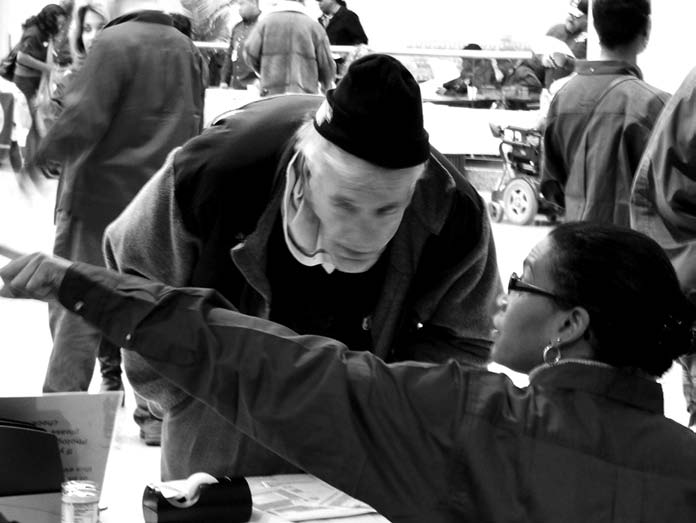Lewis Russell, 55, of Hyattsville, Md., has been unemployed for more than a year and a half.
He came to the 16th annual Winterhaven Homeless Veterans Stand Down on Jan. 21 to visit his brother, who stays at the Washington D.C. Veterans Affairs Medical Center, and hopefully land a job.
He is one of many veterans in the D.C. area considered at risk of becoming homeless by the Department of Veterans Affairs (VA).
“I’m not [homeless] yet,” Russell said. “Put it like this though — if it wasn’t for my wife, I’d be that way.”
As it looks to end veteran homelessness by 2015, the VA is shifting its focus from rescuing the homeless to preventing at-risk veterans like Russell from being on the streets in the first place.
“Our prevention efforts need to supplant our rescue efforts for us to get a handle on [homelessness],” said Secretary of Veterans Affairs Eric Shinseki, who stopped in to visit the annual event, which has traditionally emphasized outreach and service to vets who are already homeless.
More than 70 community and government agencies partnered to put on this year’s Stand Down, offering a wide range of services, from health screenings to employment opportunities to haircuts. Many services this year aimed to help veterans who have housing to hold onto it. The event drew nearly 400 veterans.
While the District’s 2011 point-in-time homeless count identified 515 homeless veterans, a number virtually unchanged from 2010, the number of homeless veterans has decreased by 23 percent since 2008, according to the Community Partnership for the Prevention of Homelessness, the nonprofit organization that coordinates the District’s homeless services. A majority of them live in shelters or on the streets, with a smaller number participating in transitional housing programs geared to helping address their homelessness. The city currently offers about 150 units of transitional housing to homeless veterans. In addition, more than 200 units of permanent supportive housing are currently available for formerly homeless vets. Nearly a third of homeless veterans struggle with substance abuse, and more than a quarter report mental health issues, according to the Community Partnership.
For some veterans who are currently housed, the economic downturn has hit hard.
Dr. Maria Llorente, the associate chief of staff for mental health for the Medical Center, said at-risk veterans face two major hurdles: unemployment and the mortgage crisis. To help these men and women pay for their homes, the Stand Down increased its focus on these problems.
“One of the new things we’ve added this year is information on mortgages and helping veterans to maybe look at how to refinance,” Llorente said. “If they are employed though, a lot of times that will mitigate the foreclosure issue.”
The VA hosted the first Stand Down in 1988 in San Diego. Since then, these events, which can last for as long as three days, occur throughout the country to make essential services readily available for homeless veterans.
New to this year’s Stand Down were two free computer training programs and a table for food stamp applications. Officials also used the event as an opportunity to announce the opening of a new community resource and referral center in Northwest Washington. The center, which will be located on 15th Street near Rhode Island Avenue, is scheduled to open this spring.
The referral center is meant to be like a year-round Stand Down, a place where homeless and at-risk veterans can find services of all kinds. Dr. Fuad Issa, the medical director of the referral center, hopes veterans come to the center “before they reach rock bottom.”
For those veterans who were already homeless, outreach workers were on hand, encouraging them to take advantage of a variety of health screenings. Those who took the tests, including temperature and blood pressure screenings, were allowed to participate in a large clothing giveaway.
“We offer those screenings here because so many of the folks who are homeless are so much more concerned with food and clothes, which I can understand, but this gives us a chance to show that there is also help from the medical side,” said Kenneth Barnum, a social worker with the Medical Center.
More than anything though, the Winterhaven Stand Down shed light on a problem that goes well beyond the event.
“This is one day of the year,” Shinseki said. “Homelessness is a 365-days-a-year issue. How do we convert this to 365 days so veterans aren’t waiting for this one day?”








